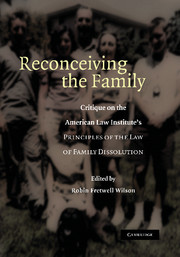 Reconceiving the Family
Reconceiving the Family Book contents
- Frontmatter
- Contents
- Acknowledgments
- Foreword, by Mary Ann Glendon
- List of Contributors
- Introduction
- PART ONE FAULT
- PART TWO CUSTODY
- PART THREE CHILD SUPPORT
- PART FOUR PROPERTY DIVISION
- PART FIVE SPOUSAL SUPPORT
- PART SIX DOMESTIC PARTNERSHIP
- PART SEVEN AGREEMENTS
- 18 The PRINCIPLES and Canada's “Beyond Conjugality” Report: The Move towards Abolition of State Marriage Laws
- 19 The ALI PRINCIPLES and Agreements: Seeking a Balance between Status and Contract
- 20 The PRINCIPLES on Agreements: “Fairness” and International Human Rights Law
- PART EIGHT JUDICIAL AND LEGISLATIVE PERSPECTIVES
- PART NINE INTERNATIONAL REFLECTIONS
- Afterword: Elite Principles: The ALI Proposals and the Politics of Law Reform, by Carl E. Schneider
- Index
20 - The PRINCIPLES on Agreements: “Fairness” and International Human Rights Law
Published online by Cambridge University Press: 25 January 2010
- Frontmatter
- Contents
- Acknowledgments
- Foreword, by Mary Ann Glendon
- List of Contributors
- Introduction
- PART ONE FAULT
- PART TWO CUSTODY
- PART THREE CHILD SUPPORT
- PART FOUR PROPERTY DIVISION
- PART FIVE SPOUSAL SUPPORT
- PART SIX DOMESTIC PARTNERSHIP
- PART SEVEN AGREEMENTS
- 18 The PRINCIPLES and Canada's “Beyond Conjugality” Report: The Move towards Abolition of State Marriage Laws
- 19 The ALI PRINCIPLES and Agreements: Seeking a Balance between Status and Contract
- 20 The PRINCIPLES on Agreements: “Fairness” and International Human Rights Law
- PART EIGHT JUDICIAL AND LEGISLATIVE PERSPECTIVES
- PART NINE INTERNATIONAL REFLECTIONS
- Afterword: Elite Principles: The ALI Proposals and the Politics of Law Reform, by Carl E. Schneider
- Index
Summary
[W]hile most courts still decline to enforce premarital agreements on the same basis as commercial contracts, no consensus emerged on the appropriate rules to apply, much less on the rationale that might be offered to explain them. These questions are the principle topic of this chapter.
Family law is again in turmoil, and the Principles are an ambitious and sometimes inspired effort to increase clarity and fairness. This turmoil can be attributed to two major factors. First, to paraphrase Professor June Carbone, family law is ground zero in the gender wars. Second, family law is reeling from the upheavals of globalization. These factors provide the backdrop against which the dilemmas addressed in Chapter 7 pertaining to agreements play out.
As the introductory quotation from the Principles suggests, Chapter 7 focuses on a particularly intriguing tension between commercial contracts and premarital agreements. This tension is grounded in the broader tension between American views on freedom of contract and autonomy in general, on the one hand, and on freedom of contract and autonomy in the specific context of the family, on the other. While the emphasis on freedom of contract may be peculiarly American, tension between legal regimes and private contractual regimes governing the family is quite common from an international perspective. As it is in the United States, the tension between competing regimes in other countries reflects deep cultural tensions.
- Type
- Chapter
- Information
- Reconceiving the FamilyCritique on the American Law Institute's Principles of the Law of Family Dissolution, pp. 392 - 408Publisher: Cambridge University PressPrint publication year: 2006


